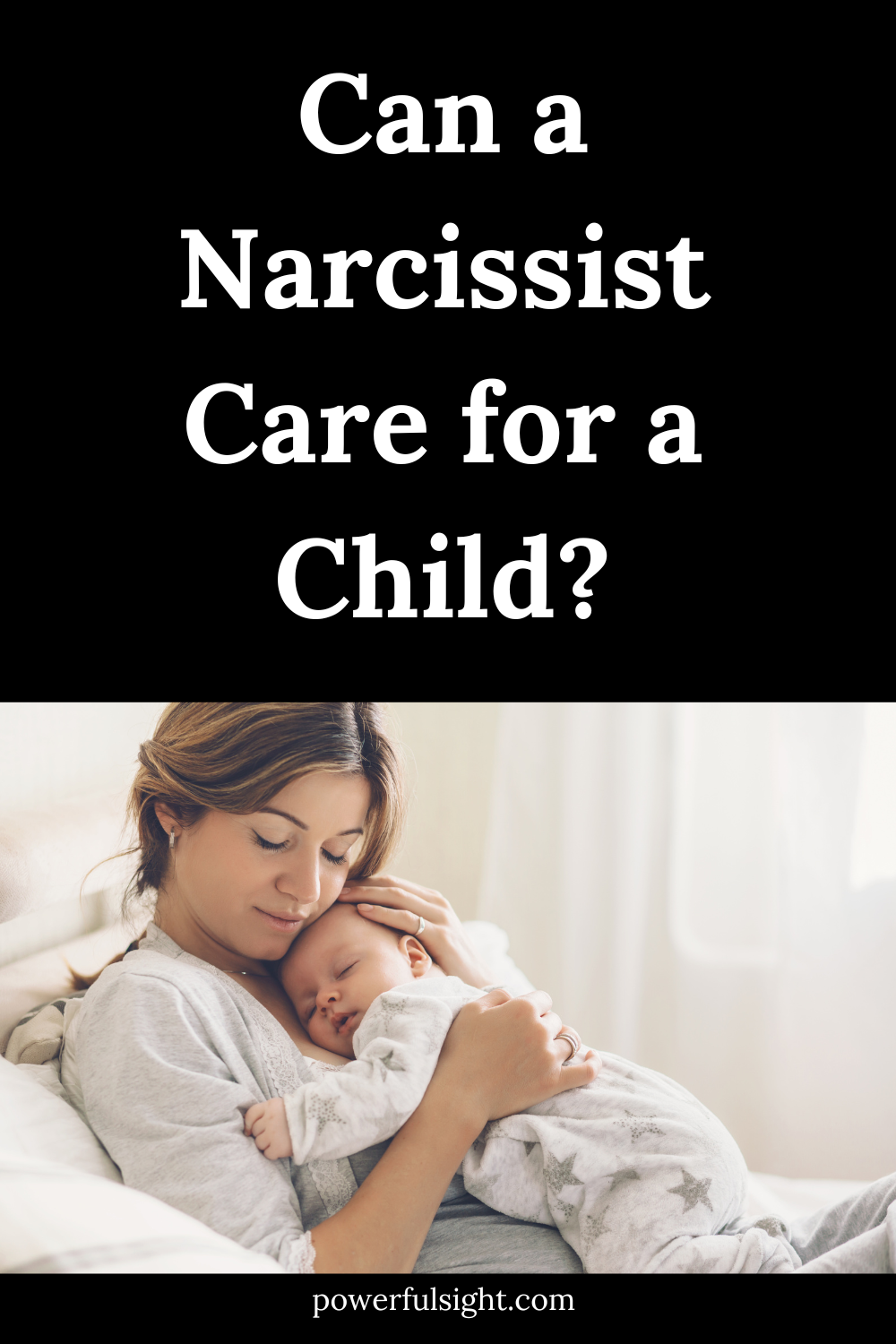This is a question you’ve probably heard before—and a question many people are currently asking.
It’s a question for those who are struggling to understand their own childhood, and a question for many who are trying to protect a child from emotional damage in the present.
Exploring this question honestly and thoroughly can be difficult and painful, but it can also bring validation, clarity, and direction.
In this post, we’ll examine the full answer: how narcissism impacts a person’s ability to provide different types of care to a child.
Can a Narcissist Care for a Child? The Short Answer
It depends. If the question is whether they can meet a child’s basic needs—food, shelter, clothing, safety—then yes, many narcissistic parents absolutely can.
But if the question is whether they can provide healthy, consistent, unconditional emotional care, then the answer becomes far more complicated.
Caring for a child isn’t just about physical needs. It’s about emotional safety, validation, and support. Narcissistic parents can provide these things at moments—but they are not guaranteed or consistent.
To understand why, we need to break down what “care” actually means.
Related: 10 Habits of People Who Grew Up With Narcissistic Parents

What Does It Mean to Care for a Child?
Before exploring how narcissism impacts parenting, it’s important to define what caring for a child really looks like.
Yes, parenting includes meeting physical needs:
-
Food
-
Clothing
-
Shelter
-
Safety
But emotional care is just as essential. Emotional care includes:
-
Empathy
-
Attunement
-
Stability
-
Patience
-
Respect for boundaries
-
Consistency
-
Supporting the child’s individuality
Parents don’t have to be perfect. They simply need to be emotionally available enough that the child feels seen, validated, and loved as a unique human being.
Narcissistic traits make this emotional availability significantly harder.
Related: How To Heal From Narcissistic Parent
Understanding Narcissism in the Parenting Context
Narcissism is not binary—no one is simply “a narcissist” or “not a narcissist.” Narcissistic tendencies can exist on a spectrum, from mild traits to full Narcissistic Personality Disorder (NPD).
Common traits across the spectrum include:
-
Fragile self-esteem hidden behind arrogance
-
A constant need for validation
-
Lack of emotional empathy
-
A self-centered worldview
-
Reactivity when criticized
These traits do not mean a narcissistic parent never loves their child. But they affect how love is given, recognized, and prioritized.
The Core Problem: Narcissism Centers the Parent, Not the Child
In emotionally healthy parenting, the child’s needs drive the parent’s responses. Emotional energy flows toward the child.
In narcissistic parenting, this flow is reversed.
The narcissistic parent expects the child to:
-
Make them feel admired
-
Provide emotional regulation
-
Validate their self-worth
-
Behave in ways that support the parent’s image
This reversal of roles is why narcissistic care is often inconsistent, conditional, or self-serving.
Related: How To Protect Kids From Narcissistic Parent
5 Ways a Narcissist Can Care for a Child
Not all narcissistic parents are the same. Some try very hard to be good parents. Some provide solid care in certain areas but struggle deeply in others.
Here are five ways a narcissist may genuinely care for their child:
1. They Can Provide Physical Care
Many narcissistic parents meet all physical and logistical needs. They may even be highly involved in school activities, routines, and daily life.
But physical care alone does not create emotional well-being.
2. They Care When It Benefits Them
A narcissistic parent may show pride or affection when the child:
-
Earns high grades
-
Performs well publicly
-
Reflects the parent’s interests
-
Enhances the parent’s social image
This may look like love—and it can feel like love to the child—but the care is conditional on performance.
3. They Care in Fleeting Moments of Vulnerability
Narcissists are not devoid of empathy; their empathy is inconsistent.
This means they may comfort their child at times, then completely withdraw the next day. These moments do not resolve the broader patterns of emotional instability.
4. They Care When Their Control Isn’t Threatened
If the child’s needs align with the parent’s desires, care flows smoothly.
But when the child becomes independent—emotionally or behaviorally—the parent may respond with:
-
Punishment
-
Criticism
-
Withdrawal
Their care is easily disrupted by autonomy.
5. They Care Intellectually, Not Emotionally
Some narcissistic parents understand parenting on a cognitive level:
-
They read books
-
They attend events
-
They know what “good parenting” looks like
But emotional care requires vulnerability, selflessness, and empathy—traits that narcissism fundamentally disrupts.
Related: How To Respond to a Narcissistic Parent
Where Care Breaks Down: Emotional Care
The following areas are where the care of a narcissistic parent typically breaks down:
1. Emotional Empathy
They may understand a child’s emotions intellectually, but they cannot connect with them emotionally.
This causes:
-
Misattuned responses
-
Invalidation
-
Minimizing the child’s feelings
-
Everything being redirected toward the parent
The child learns their inner world doesn’t matter.
2. Unconditional Love
Narcissistic parents often offer love based on:
-
Behavior
-
Achievement
-
Obedience
-
Validation of the parent
This creates a painful belief: “Love must be earned.”
3. Emotional Manipulation
Common forms include:
-
Guilt-tripping
-
Silent treatment
-
Love-bombing cycles
-
Gaslighting
-
Triangulation
-
Shaming
These tactics damage a child’s trust, self-esteem, and emotional stability.
Related; How To Respond To Narcissistic Manipulation
4. Competition with the Child
As children grow, narcissistic parents may feel jealous or threatened.
They may:
-
Undermine achievements
-
Withhold praise
-
Criticize independence
-
Turn others against the child
Healthy parents celebrate their child. Narcissistic parents compete with them.
5. Inconsistent Availability
Children experience cycles of:
-
Warmth → Withdrawal
-
Praise → Criticism
-
Engagement → Neglect
This creates hypervigilance and anxiety in the child.
Summary:
So, Can a Narcissist Truly Care for a Child?
A narcissistic parent can care—but not consistently, not selflessly, and not in a way that reliably supports healthy emotional development.
A narcissistic parent may:
-
Provide physical needs
-
Show love at times
-
Care when it benefits them
But they struggle to:
-
Prioritize the child
-
Validate emotions
-
Provide unconditional love
-
Offer stable, empathetic support
A Narcissistic Parent Can Care—But They Cannot Prioritize
A narcissistic parent may genuinely love their child.
But when forced to choose between:
-
The child’s needs
-
And their own ego, image, or emotional comfort
They choose themselves.
This is why the child is never the true priority.
A Child’s Experience Matters More Than the Parent’s Intent
Some narcissistic parents genuinely believe they are good parents. They may not realize the emotional harm their behavior causes.
But parenting is measured by impact, not intent.
Children of narcissistic parents often grow up with:
-
Self-doubt
-
Trust issues
-
Emotional numbness or hypervigilance
-
Perfectionism
-
Guilt around boundaries
-
Fear of rejection
-
A fragmented sense of self
These patterns reflect the long-term impact of inconsistent or conditional care.
Are There Exceptions?
Change is possible—but rare.
A narcissistic parent would need:
-
Deep self-awareness
-
Long-term therapy
-
Willingness to admit flaws
-
Emotional vulnerability
-
Commitment to growth
Many narcissistic individuals are not ready—or able—to take these steps.
Children Need Consistent Care Above All Else
If a child is being raised by a narcissistic parent, they especially need:
-
At least one emotionally healthy caregiver
-
Consistency and validation
-
Support for self-expression
-
Clear boundaries
-
Therapeutic support when needed
-
A safe emotional environment
A child does not need perfection.
They need stability, empathy, and safety.
Even one healthy caregiver can make a profound difference.
Final Thoughts
Can a narcissist care for a child?
The short answer: Not in the way a child truly needs.
A narcissistic parent can care—but the care is typically conditional, inconsistent, and self-focused. It depends on the child’s ability to regulate, validate, or enhance the parent’s emotional world.
What matters most is the child’s experience, not the parent’s intention.
Providing children with stable, reliable emotional support—whether from one parent, a relative, a therapist, or another caregiver—is essential for healing and long-term well-being.
Save the pin for later

- How To Make A Narcissist Leave The Relationship On Their Own - 24/01/2026
- 5 Cute Date Night Outfits for Winter - 24/01/2026
- How To Boost Your Wellness Routine - 24/01/2026
